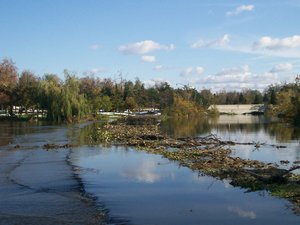Last week, environmental watchdog groups including the National Parks Conservation Association (NPCA), Riverkeeper, the Delaware Riverkeeper Network and the Columbia Environmental Law Clinic filed a lawsuit against the Delaware River Basin Commission (DRBC) and the Army Corps of Engineers. The suit argues that the DRBC and Army Corps are violating the National Environmental Policy Act by proposing gas drilling regulations in the Delaware Basin and not conducting a full environmental review.
The Delaware River is the largest free flowing river east of the Mississippi. Running beneath more than a third of the River’s Watershed is the Marcellus Shale formation. Gas producers and academics estimate that trillions of cubic feet of unconventional gas could be extracted from the shale rock.
The legal documents filed in a U.S. District Court in Brooklyn say that drilling near the Upper Delaware National Scenic and Recreational River and Delaware Water gap poses risks to water quality and quantity, air quality, recreation and wildlife in the region.
Cinda Waldbuesser, Pennsylvania senior program manager for NPCA, says:
“With 5.4 million visitors annually, the Upper Delaware National Scenic and Recreational River and Delaware Water Gap National Recreation Area are national treasures that must be protected for our children and grandchildren to enjoy.”
“The economic benefits of natural gas development must not compromise the long-term benefits of protecting water quality and preserving our national parks, which are already economic generators for local communities.”
Kate Hudson, Riverkeeper Watershed Program director adds:
“The Delaware River Basin provides fifty percent of the clean, unfiltered drinking water that nine million New Yorkers depend on daily.”
“This critical resource should not be put at risk by allowing drilling to proceed in the Basin before a complete environmental impact assessment has been carried out as the basis for developing the most effective regulations possible. Absent that review, there is no assurance that the regulations the DRBC is poised to finalize will be adequate to control a risky industrial activity that has already caused documented environmental and human health impacts in other states…No one’s drinking water should be sacrificed in the rush to pursue exploitation of methane gas deposits that have existed for millions of years.”
The DRBC is a five member intra-state agency made up of the governors of Delaware, New Jersey, Pennsylvania and New York, with the Army Corps of Engineers representing the federal government. The mandate for this regional body is to oversee the health of the river. In order to do so, the DRBC runs programs including: water quality protection, water supply allocation, regulatory review (permitting), water conservation initiatives, watershed planning, drought management and flood loss reduction.
According to Kenneth Kristl, director of the Environmental Law Clinic at Widener University, the suit is not really about the lack of a formal environmental review, but rather a demand that the court determine whether or not the DRBC is a federal agency. If it is, then the National Environmental Policy Act applies and the DRBC and the Army Corps will be found in violation of the act with their December 2010 draft drilling regulations.
This suit is similar to a suit filed in May against the DRBC by New York Attorney General Eric Schneiderman. His lawsuit claimed that the federal government failed to study the dangers of unconventional gas drilling using hydraulic fracturing (fracking) before permitting the use of the method in the Delaware River Basin.
Also, in February the Delaware Riverkeeper and the Damascus Citizens for Sustainability filed a suit in Trenton arguing that the DRBC, as a federal agency, should not be green-lighting exploratory wells in the corridor. At the time, the environmentalist groups accused the DRBC of wrongly permitting the wells and called for their removal as well as for restoring these sites.
Subscribe to our newsletter
Stay up to date with DeSmog news and alerts






